from May. 1, 1865
Miss Laura Keene
-
Full Title
Miss Laura Keene; John Wilkes Booth, the assassin of President Lincoln
-
Description
Portrait of Miss Laura Keene; portrait of John Wilkes Booth, the assassin of President Lincoln. Illustration from an early account of Lincoln's death, "The Terrible Tragedy at Washington: Assassination of President Lincoln."
-
Source
Springer Collection, Oakland University Special Collections
-
Rights
This item may be reproduced and used for any purpose, including research, teaching, private study, publication, broadcast, or commercial use, with proper citation and attribution.
-
Tags
-
Cite this Item
anonymous. "Miss Laura Keene; John Wilkes Booth, the assassin of President Lincoln". Barclay and Co.. Remembering Lincoln. Web. Accessed June 23, 2025. https://rememberinglincoln.fords.org/node/798
from May. 1, 1865
Miss Laura Keene; John Wilkes Booth, the assassin of President Lincoln
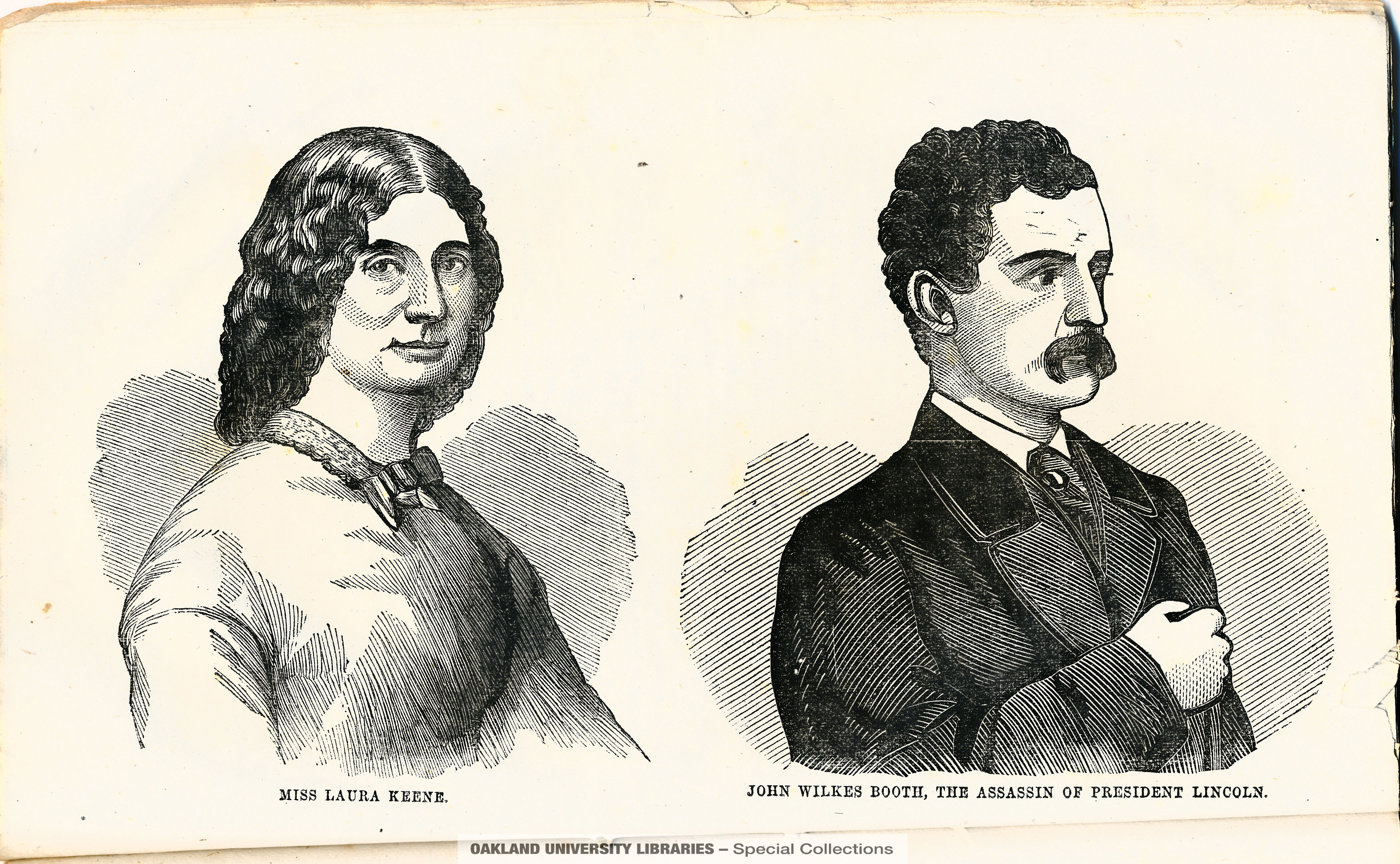
-
Description
Portrait of Miss Laura Keene; portrait of John Wilkes Booth, the assassin of President Lincoln. Illustration from an early account of Lincoln's death, "The Terrible Tragedy at Washington: Assassination of President Lincoln."
-
Source
Springer Collection, Oakland University Special Collections
-
Rights
This item may be reproduced and used for any purpose, including research, teaching, private study, publication, broadcast, or commercial use, with proper citation and attribution.
-
Creator
anonymous
-
Publisher
Barclay and Co.
-
Date
May 1, 1865
-
Material
paper
from May. 1, 1865
Booth Escaping
-
Full Title
Booth Escaping
-
Description
Escape of John Wilkes Booth after the assassination. Illustration from an early account of Lincoln's death, "The Terrible Tragedy at Washington: Assassination of President Lincoln."
-
Source
Springer Collection, Oakland University Special Collections
-
Rights
This item may be reproduced and used for any purpose, including research, teaching, private study, publication, broadcast, or commercial use, with proper citation and attribution.
-
Tags
-
Cite this Item
anonymous. "Booth Escaping". Barclay and Co.. Remembering Lincoln. Web. Accessed June 23, 2025. https://rememberinglincoln.fords.org/node/796
from May. 1, 1865
Booth Escaping
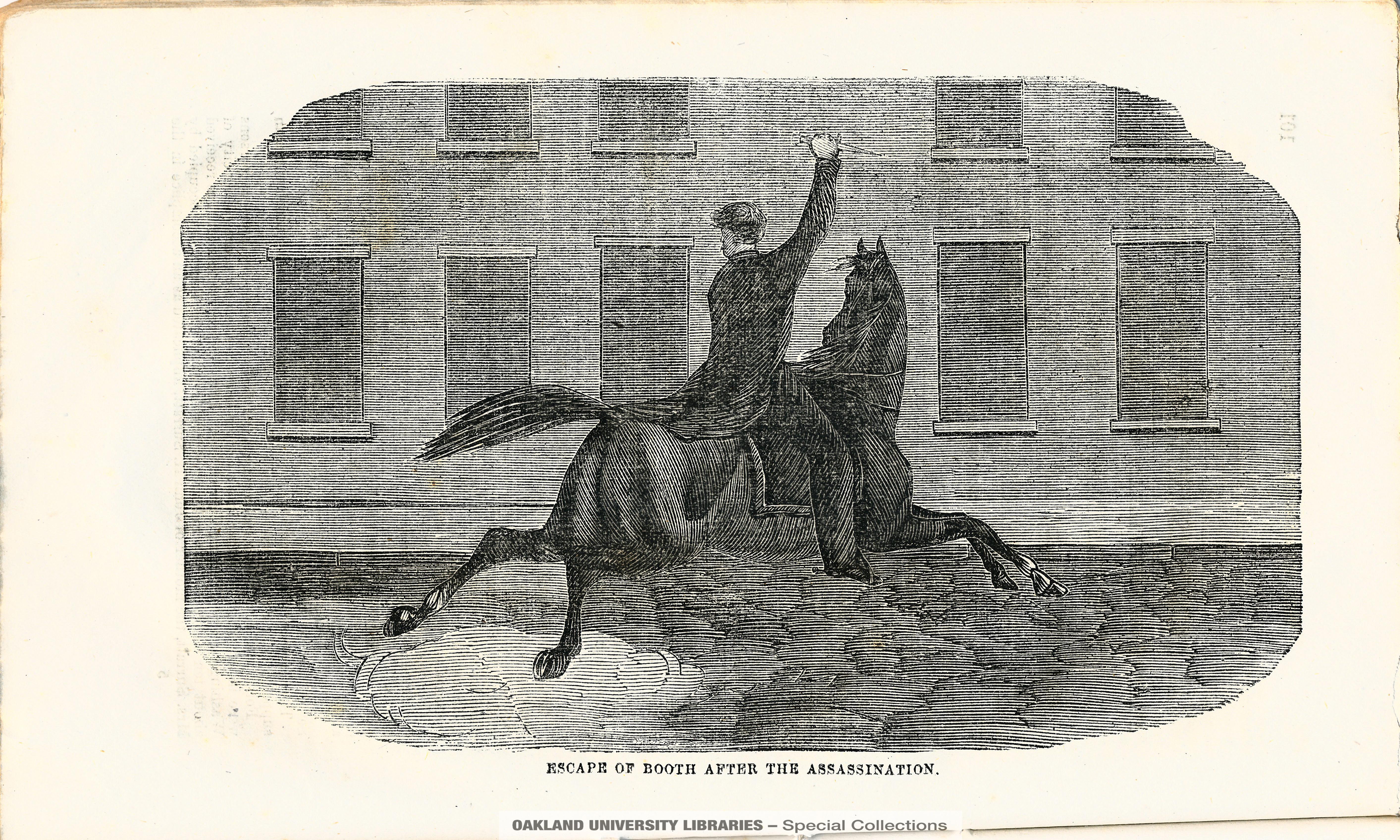
-
Description
Escape of John Wilkes Booth after the assassination. Illustration from an early account of Lincoln's death, "The Terrible Tragedy at Washington: Assassination of President Lincoln."
-
Source
Springer Collection, Oakland University Special Collections
-
Rights
This item may be reproduced and used for any purpose, including research, teaching, private study, publication, broadcast, or commercial use, with proper citation and attribution.
-
Creator
anonymous
-
Publisher
Barclay and Co.
-
Date
May 1, 1865
-
Material
paper
from Apr. 20, 1865
"The Great Tragedy"
-
Full Title
"The Great Tragedy"
-
Description
The Richmond Whig recounts the assassination and describes the feeling of mourning that pervaded the capital and the nation. It includes an excerpt from a witness at Ford's Theatre.
-
Source
Library of Congress, Alfred Whital Stern Collection of Lincolniana, portfolio 5
-
Rights
This item is in the public domain and may be reproduced and used for any purpose, including research, teaching , private study, publication, broadcast or commercial use, with proper citation and attribution
-
Tags
-
Cite this Item
The Richmond Whig. ""The Great Tragedy"". Remembering Lincoln. Web. Accessed June 23, 2025. https://rememberinglincoln.fords.org/node/757
-
Creator
The Richmond Whig
-
Date
April 20, 1865
from Apr. 20, 1865
"The Great Tragedy"

-
Description
The Richmond Whig recounts the assassination and describes the feeling of mourning that pervaded the capital and the nation. It includes an excerpt from a witness at Ford's Theatre.
-
Source
Library of Congress, Alfred Whital Stern Collection of Lincolniana, portfolio 5
-
Rights
This item is in the public domain and may be reproduced and used for any purpose, including research, teaching , private study, publication, broadcast or commercial use, with proper citation and attribution
-
Creator
The Richmond Whig
-
Date
April 20, 1865
from Apr. 15, 1865
"Terrible Work of Blood!"
-
Full Title
"Terrible Work of Blood!"
-
Description
This broadside printed in Madison, Indiana announces Lincoln's death, reprints Edwin Stanton's reports and mistakenly says that Seward is dying.
-
Source
Library of Congress, Alfred Whital Stern Collection of Lincolniana, portfolio 7, no. 60
-
Rights
This item is in the public domain and may be reproduced and used for any purpose, including research, teaching , private study, publication, broadcast or commercial use, with proper citation and attribution
-
Tags
-
Cite this Item
anonymous. ""Terrible Work of Blood!"". Remembering Lincoln. Web. Accessed June 23, 2025. https://rememberinglincoln.fords.org/node/754
-
Creator
anonymous
-
Date
April 15, 1865
from Apr. 15, 1865
"Terrible Work of Blood!"

-
Description
This broadside printed in Madison, Indiana announces Lincoln's death, reprints Edwin Stanton's reports and mistakenly says that Seward is dying.
-
Source
Library of Congress, Alfred Whital Stern Collection of Lincolniana, portfolio 7, no. 60
-
Rights
This item is in the public domain and may be reproduced and used for any purpose, including research, teaching , private study, publication, broadcast or commercial use, with proper citation and attribution
-
Creator
anonymous
-
Date
April 15, 1865
from Apr. 15, 1865
James S. Knox to his Father
-
Full Title
James S. Knox to his Father
-
Description
James S. Knox, a witness to the assassination, writes a detailed letter to his father describing the event, as well as the attacks at the Seward home, and the national feeling, saying that "the nation is aroused and terrible will be its vengeance."
-
Transcription
Ac 9360
Washington, DC
April 15, 1865
Dear Father,
It is with sad feeling that I take up my pen to address you. Last Friday night at 10 oclock, I witnessed the saddest tragedy ever was had in this country. Notwithstanding my promise to you not to visit the theatre, I cannot resist the temptation to see General Grant and the President, and when the curtain at Ford’s rose on the play of Our American Cousin my room mate and I were seated on the second row of the orchestra seats, just beneath the President’s box. The President entered the theatre at 8 ½ o’ck, amid deafening cheers and the rising of all. Everything was cheerful, and never was our magistrate more enthusiastically welcomed. Or more happy. Many pleasant allusions were made to him in the play, to which the audience gave deafening responses, while Mr. Lincoln laughed heartily and beamed frequently to the gratified people. Just after the 3rd Act, and before the scenes were shifted, a muffled pistol shot was heard, and a man sprang wildly from the national box, partially tearing down the flag, then shouting “ ‘sic semper tyrannis’, the south is avenged “ with brandished dagger, rushed across the stage and disappeared. The whole theatre was paralyzed. But two men sprang for the stage, a Mr. Stewart and myself. Both of us were familiar with the play, and suspected the fearful tragedy. We rushed after the murderer, and Mr. Stewart being familiar with the passages, reached the rear door in time to see him spring on his horse and ride off – I became lost amid the scenery and was obliged to return. My roommate had followed me and secured the murderer’s hat. The shrill cry of murder from Mrs. Lincoln first roused the horrified audience, and in an instant the uproar was terrible. The silence of death was broken by shouts of “kill him”, “hang him” and strong men wept and cursed, and tore the seats in the impotence of their anger, while Mrs. Lincoln, on her knees uttered shriek after shriek at the feet of the dying President. Finally the theatre was cleared and the President removed. Still greater was the excitement in the city. Rumors of the murder of Sec’y Seward and his son reached us as we gained the street – Mounted patrols dashed everywhere, bells tolled the alarm, and excited crowds rushed about the avenues, Despair was on every countenance, and black horror brooded over the city. Until long after midnight I was detained at Police Hd.Qrs., giving my evidence, and when I sought my room, in a distant part of the city – dark clouds had gathered in the heavens, and soldiers sternly paced their patrol. May I never see another such night. I could not sleep. I could only think, (but?) thought was weary, and in despair thought again.
Yesterday morning the President died. At 8 ½ ock, the kindest, noblest, truest heart ceased to beat, and Abraham Lincoln was dead. Let no man ever speak to me again about Southern Chivalry, or talk in sympathy with traitors. The events of last night can never be forgotten and while there is strength in my arm, I never can, never will, endure it – nor am I alone – the nation is aroused and terrible will be its new glower, Treason, pardoned, forgiven, patiently dealt with by our president, viper like, has stung the breast, that kindly treated it, and the traitor South has slain its bravest, noblest friend. Bitter, bitter will be the tears of repentance. But I cannot write of it – Andrew Johnson has been sworn, His speech was simple, “The duties now are mine, the results are God’s”. I trust he may perform his task faithfully, but, oh, for the Confidence, and the hope that we had in Lincoln, like a ship without a rudder is the nation tossed. Outwardly are we quiet, but in each heart, what horror, misgivings and despair-
But I must cease – (Lolita?) & Will R – left here Friday night. I presume by this time they are with you. By them you can learn of me better than I can write. Love to all.
Your affect son
James Knox
[Transcription by Dale Anderson.] -
Source
-
Rights
This item is in the public domain and may be reproduced and used for any purpose, including research, teaching , private study, publication, broadcast or commercial use, with proper citation and attribution
-
Tags
-
Cite this Item
James S. Knox. "James S. Knox to his Father". Remembering Lincoln. Web. Accessed June 23, 2025. https://rememberinglincoln.fords.org/node/753
-
Creator
James S. Knox
-
Date
April 15, 1865
from Apr. 15, 1865
James S. Knox to his Father
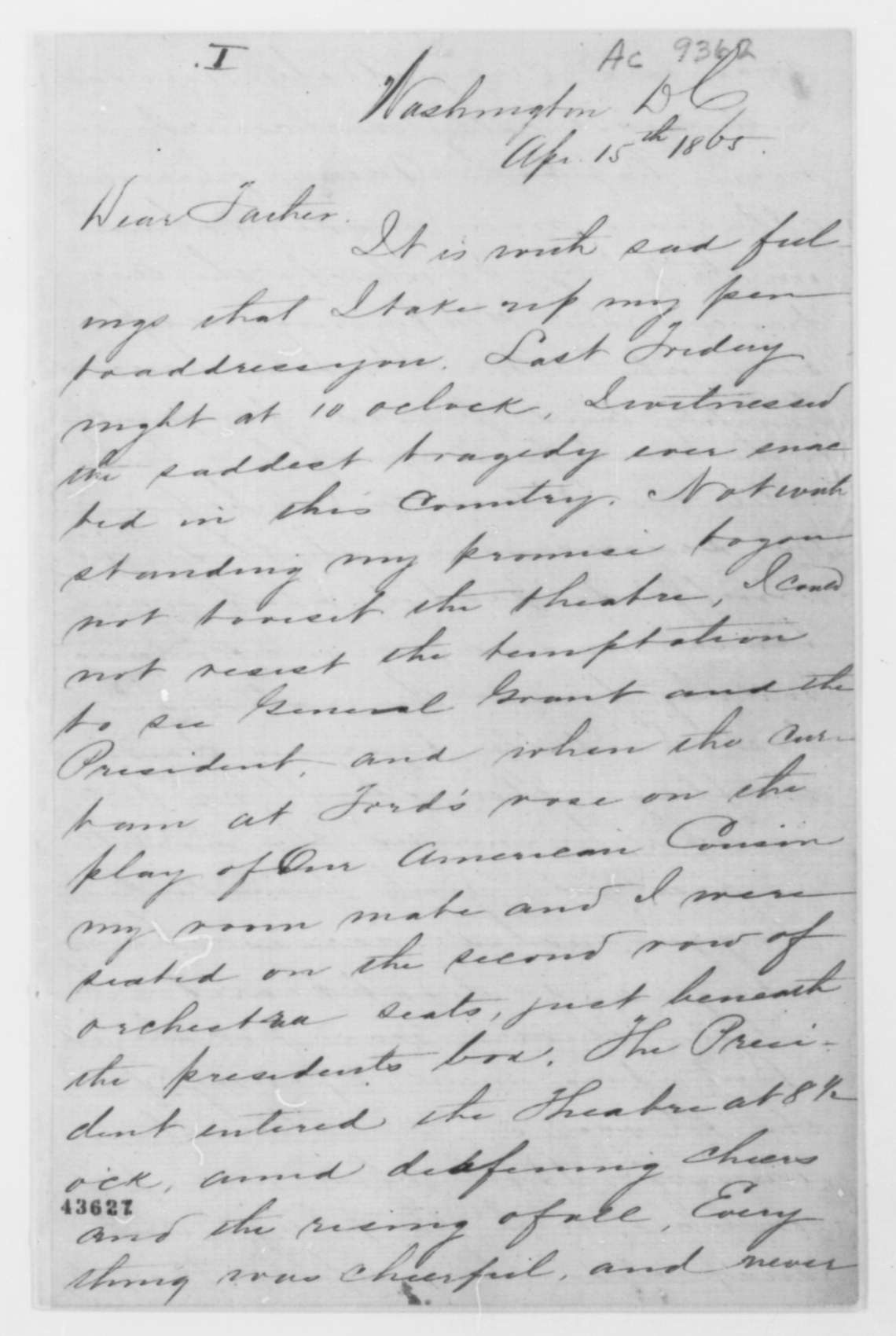
-
Description
James S. Knox, a witness to the assassination, writes a detailed letter to his father describing the event, as well as the attacks at the Seward home, and the national feeling, saying that "the nation is aroused and terrible will be its vengeance."
-
Source
-
Rights
This item is in the public domain and may be reproduced and used for any purpose, including research, teaching , private study, publication, broadcast or commercial use, with proper citation and attribution
-
Creator
James S. Knox
-
Date
April 15, 1865
from Apr. 15, 1865
"Awful Tidings! The President Assassinated!"
-
Full Title
"Awful Tidings! The President Assassinated!"
-
Description
The Buffalo Commercial Advertisement recounts the assassination and reprints a report sent by Secretary of War Edwin Stanton.
-
Source
Library of Congress, Alfred Whital Stern Collection of Lincolniana, portfolio 5
-
Rights
This item is in the public domain and may be reproduced and used for any purpose, including research, teaching, private study, publication, broadcast or commercial use, with proper citation and attribution.
-
Tags
-
Cite this Item
Buffalo Commercial Advertisement. ""Awful Tidings! The President Assassinated!"". Remembering Lincoln. Web. Accessed June 23, 2025. https://rememberinglincoln.fords.org/node/752
-
Creator
Buffalo Commercial Advertisement
-
Date
April 15, 1865
from Apr. 15, 1865
"Awful Tidings! The President Assassinated!"

-
Description
The Buffalo Commercial Advertisement recounts the assassination and reprints a report sent by Secretary of War Edwin Stanton.
-
Source
Library of Congress, Alfred Whital Stern Collection of Lincolniana, portfolio 5
-
Rights
This item is in the public domain and may be reproduced and used for any purpose, including research, teaching, private study, publication, broadcast or commercial use, with proper citation and attribution.
-
Creator
Buffalo Commercial Advertisement
-
Date
April 15, 1865
from Apr. 16, 1865
"Arrest of Booth!"
-
Full Title
"Arrest of Booth!"
-
Description
An April 16, 1865 edition of the Daily Monitor Extra from Concord, Vermont that falsely reports the arrest of John Wilkes Booth.
-
Transcription
DAILY MONITOR EXTRA
SUNDAY, APRIL 16, 1865
Special Dispatches to the Concord Daily Monitor by the American Line and the Vermont and Canada Line.
ARREST OF BOOTH!
Arrangements for Mr. Lincoln’s Funeral.
President Johnson Retains the old Cabinet.
Mr. Hunter Secretary of State Pro Tem.
Mr. Seward & Son Doing Well.
Wm. Springer Arrested for Complicity with Booth.
Washington, April 15th. The details of the assassination have already been spread broadcost. All of the evidence which has been elicited during to-day and to-night, point beyond all doubts to John Wilkes Booth as the assassin of the President, and the ringleader in the diabolical plot.
It has not appeared that he has had more than two accomplices, while their object seems to have been more especially to take the life of the President. In the letters in Booth’s trunk, captured at the National Hotel, one desperado only seems to write of attacking the President, and somewhat deterred Booth to abandon his intention. This demonstrates clearly the matured plot, and disposes entirely of the stories of insanity. It is shown further by the testimony today, that Booth did not assassinate Secretary Seward and son, but left his accomplice to do that work. The theory that he did both deeds by disguising himself, is very effectually exploded. Those who have been thrown into Booth’s company for the past few days describe him as laboring under very strong mental excitement, occasioned by drink and the rejection of his suit by a young lady here, on the ground of his strong secession views.
Yesterday morning he sauntered into the box office at Ford’s Theatre, and learned incidentally that Gen. Grant and President Lincoln would visit the play last night. From that moment he undoubtedly resolved to commit the assassination that night. From the box office he went to the livery stable in the rear of the National, where at noon he hired a fleet horse.
At four o’clock he came into the National, took two cards from the clerk that had been left by two suspicious looking men, and calling for paper went behind the clerk’s desk and commenced writing. It was particularly noticed that he had a wild look, and was so absent minded as to ask the clerk in dating his note what hour it was.
At 6 o’clok [clock] he was promenading leisurely on Pennsylvania Avenue, dressed in his usual genteel manner. At half past seven he was again seen in the restaurant adjoining Ford’s Theatre, where he drank a glass of brandy. From thence he passed into the theatre where he was usually found about 8 o’clock. Soon after nine he went out and brought his horse to the front of the theatre and got Wm. Springler, the carpenter of the theatre, and now under arrest, to hold the animal. Booth was noticed to go into the theatre and pass around into the dress circle to the side on which the President was seated. The aisle next to the wall was crowded, so that he had considerable trouble in pushing his way through to the President’s box. On reaching there he was halted by the sentinel, who is placed there to prevent intrusion on the President. To the sentinel he mentioned the name of some distinguished gentleman who desired to see Mr. Lincoln, and being very neatly dressed was allowed to pass without suspicion.
The shooting as already detailed by telegraph then occurred.
Booth mounted his horse and fled, and at this writing, that is the last that has been seen of him. His accomdlice [accomplice] in this terrible crime is not so well known, but is believed to be a notorious Maryland desperado, named Surrat [Surratt].
WASHINGTON, April 15th—12 M. Up to a late hour no news of the whereabouts of the assassin has been received. Secretary Seward is very comfortable to-night. It is not believed that Fred. Seward will live till daylight. The New York train was allowed to bring in its passengers to-night.
About 11 o’clock on Friday evening two men crossed the Anacosta [Anacostia] Bridge, one of whom gave his name as Booth, and the other as Smith. The latter is said to be Surrat. A riderless horse was found last night, which has been identified by the proprietor of one of the stables as having been hired from his stable. To-day no one will be allowed to leave the city by rail conveyance or on foot, and the issue of papers from headpuarters [headquarters] of the Department of Washington has been suspended by Gen. Augur. It is understood that the intelligence of the death of the President has not been communicated to Secretary Seward, nor of the attack on his son, his critical condition rendering perfect quiet essential to his recovery.
1 A.M.—Secretary Seward was in apparently a comfortable condition. His son Frederick remains insensible, with less favorable symptoms than his father.
Secretary Seward retains his full mental faculties. He to-night was made aware of the death of the President. A strong military guard has been placed around the residence of the several Cabinet officers and around the Executive Mansion.
At midnight the condition of Secretary Seward was the same as last reported. The day of the funeral of the President has not yet been fixed. The remains will be removed to Springfield, Ill. The coffin for the President’s remains is covered with black cloth, and lined with lead, the latter being covered with white satin. A silver plate on the coffin, over the breast, bears the following inscription:
“ABRAHAM LINCOLN
16th President of the United States.
Born July 12, 1809. Died April 15, 1865.”
The remains have been embalmed. The external appearance of the face of the President was that of a deep black stain about both eyes; otherwise the face was very natural. The wound was in the left side of the head, behind the left ear. The course of the ball was obliquely forward, towards the right eye. The ball was found embedded five inches behind the right eye. The wound was half an inch in diameter.
It is said that the funeral of the President will take place on Thursday, in order to enable distant friends to arrive.
________________________
Official from Sec’y Stanton.
[By Vermont and Boston Telegraph Line—Office at the Depot.]
WAR DEPARTMENT, Washington, 15.
To Maj. Gen. Dix:
The official notice of the death of the late President Abraham Lincoln, was given by the heads of the departments this morning to Andrew Johnson, Vice President, upon whom by the Constitution devolved the office of President. Mr. Johnson, on receiving this notice, appeared before Chief Justice Chase and took the oath of office as President of the United States, and assumed its duties and functions. At 12 o’clock the President met the heads of the departments in a cabinet meeting at the Treasury building, and among other business the following was transacted: 1. The funeral of the late President was referred to the several secretaries, as far as relates to their respective departments. 2. William Hunter was appointed Acting Secretary of State during the disability of Mr. Seward, and his son Frederick Seward, the Assistant Secretary. 3. The President formally announced that he desired to retain the present secretaries of the departments for his cabinet, and they would go on and discharge their respective duties in the same manner as before the deplorable even[t] that had changed the head of the government.
All business in the departments was suspended during the day. The surgeons report that Mr. Seward’s condition remains unchanged. He is doing well. There is no improvement in Mr. Frederick Seward. The murderers have not yet been apprehended.
E. M. STANTON
________________
A dispatch received from Baltimore at 10 o'clock A.M., states that Booth has been arrested near Baltimore and is now confined on board of a Monitor for safe keeping. This dispatch seems to be entitled to credit though not yet officially confirmed. His accomplice is still at large.
________________
[Special to the Sunday Herald.]
WASHINGTON, April 15, 1:30 P. M.—The President is lying in state at the White House. No one is allowed to approach within two squares, except privileged persons. The man, William Springer [Edman Spangler], who held Booth’s horse at the door of Ford’s Theatre, has been arrested. The clerks at the National Hotel, where Booth boarded until last evening, state that two very suspicious persons called for him yesterday, and that in the evening all suddenly disappeared. A sentinel was placed in the passage-way to the private box occupied by the President before the performance commenced. Booth passed this sentry by giving the name of some Governor. These facts are arrived at from an authentic source, and evidence seems strong that Booth is after all the man who assassinated Secretary Seward.
_____________________
No further telegraphic dispatches will be received in this city before 5 o’clock th [this] afternoon. Ahything [anything] received at that hour will be promptly bulletined at this office.
_______________________
At the Episcopal church this morning prayers were read for the nation in its deep affliction, and the usual Easter festivities were deferred.
[Transcription by: Deborah Taylor] -
Source
Library of Congress, Alfred Whital Stern Collection of Lincolniana, portfolio 3, no. 9, Stern catalog 4754
-
Rights
This item is in the public domain and may be reproduced and used for any purpose, including research, teaching, private study, publication, broadcast or commercial use, with proper citation and attribution
-
Tags
-
Cite this Item
Daily Monitor Extra. ""Arrest of Booth!"". Remembering Lincoln. Web. Accessed June 23, 2025. https://rememberinglincoln.fords.org/node/751
-
Creator
Daily Monitor Extra
-
Date
April 16, 1865
from Apr. 16, 1865
"Arrest of Booth!"
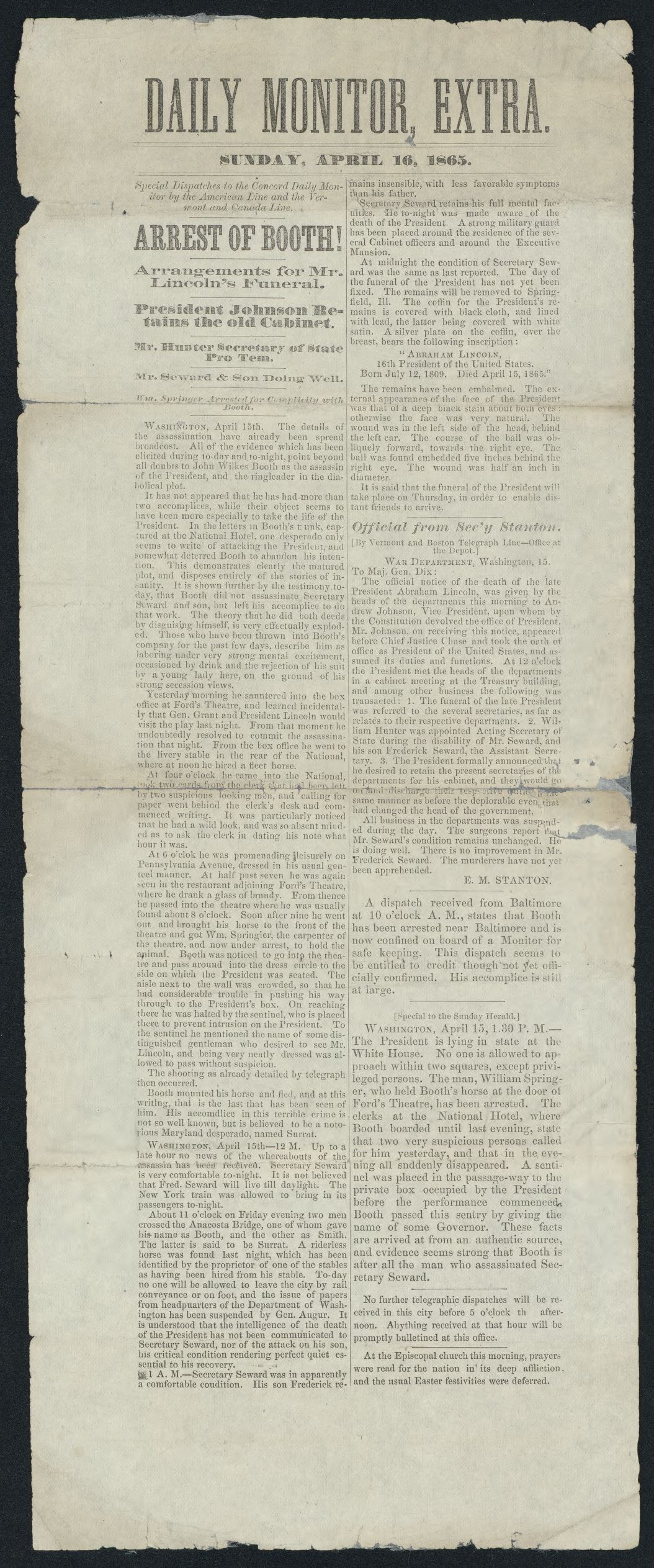
-
Description
An April 16, 1865 edition of the Daily Monitor Extra from Concord, Vermont that falsely reports the arrest of John Wilkes Booth.
-
Source
Library of Congress, Alfred Whital Stern Collection of Lincolniana, portfolio 3, no. 9, Stern catalog 4754
-
Rights
This item is in the public domain and may be reproduced and used for any purpose, including research, teaching, private study, publication, broadcast or commercial use, with proper citation and attribution
-
Creator
Daily Monitor Extra
-
Date
April 16, 1865
from Apr. 21, 1865
"A Monument to the Martyr President in Baltimore"
-
Full Title
"A Monument to the Martyr President in Baltimore"
-
Description
Edition of the American and Commercial Advertiser that announces a monument to President Lincoln and reprints the award offered for the assassin.
-
Source
Library of Congress, Alfred Whital Stern Collection of Lincolniana, portfolio 6, no. 12
-
Rights
This item is in the public domain and may be reproduced and used for any purpose, including research, teaching ,private study, publication, broadcast or commercial use, with proper citation and attribution
-
Tags
-
Cite this Item
American and Commercial Advertiser. ""A Monument to the Martyr President in Baltimore"". Remembering Lincoln. Web. Accessed June 23, 2025. https://rememberinglincoln.fords.org/node/750
-
Creator
American and Commercial Advertiser
-
Date
April 21, 1865
from Apr. 21, 1865
"A Monument to the Martyr President in Baltimore"

-
Description
Edition of the American and Commercial Advertiser that announces a monument to President Lincoln and reprints the award offered for the assassin.
-
Source
Library of Congress, Alfred Whital Stern Collection of Lincolniana, portfolio 6, no. 12
-
Rights
This item is in the public domain and may be reproduced and used for any purpose, including research, teaching ,private study, publication, broadcast or commercial use, with proper citation and attribution
-
Creator
American and Commercial Advertiser
-
Date
April 21, 1865
from Apr. 16, 1865
"Horrible News! Culmination of Southern Fanaticism and Barbarism"
-
Full Title
"Horrible News! Culmination of Southern Fanaticism and Barbarism"
-
Description
April 16, 1865 edition of the Dubuque Daily Times from Dubuque, Iowa announcing the assassination and denouncing the act.
-
Source
Library of Congress, Alfred Whital Stern Collection of Lincolniana portfolio 8
-
Rights
This item is in the public domain and may be reproduced and used for any purpose, including research, teaching, private study, publication, broadcast or commercial use, with proper citation and attribution
-
Tags
-
Cite this Item
Dubuque Daily Times. ""Horrible News! Culmination of Southern Fanaticism and Barbarism"". Remembering Lincoln. Web. Accessed June 23, 2025. https://rememberinglincoln.fords.org/node/741
-
Creator
Dubuque Daily Times
-
Date
April 16, 1865
from Apr. 16, 1865
"Horrible News! Culmination of Southern Fanaticism and Barbarism"

-
Description
April 16, 1865 edition of the Dubuque Daily Times from Dubuque, Iowa announcing the assassination and denouncing the act.
-
Source
Library of Congress, Alfred Whital Stern Collection of Lincolniana portfolio 8
-
Rights
This item is in the public domain and may be reproduced and used for any purpose, including research, teaching, private study, publication, broadcast or commercial use, with proper citation and attribution
-
Creator
Dubuque Daily Times
-
Date
April 16, 1865
from Apr. 17, 1865
The Intelligencer
-
Full Title
The Intelligencer, April 17, 1865
-
Description
April 17, 1865 edition of The Intelligencer which recounts the assassination and offers eloquent words of praise for Lincoln, stating, "Abraham Lincoln is mourned more widely, more warmly, more inconsolably than any of his predecessors in the Presidential Chair. The man himself, is not less than the unprecedented circumstances of his administration, and the appalling manner of his death, appealed to the popular heart for an outpouring of sympathizing testimonial" [...]
Attributes the murder to the "the same hand that has been so long raised to deal a fatal blow to his country, and that has struck down so many of our noblest and best, has at last laid low the chosen chief. Slavery, treason and assassination culminated in the act. More than ever all these will henceforth be accused of mankind."
The article also strongly condemns the conspirators, saying "they are bound together by the most horrible and dreadful oath" and that "once [Booth] is caught the last means every devised to extort confession and implication from criminals should be practiced upon him." -
Source
-
Rights
This item is in the public domain and may be reproduced and used for any purpose, including research, teaching, private study, publication, broadcast or commercial use, with proper citation and attribution
-
Tags
-
Cite this Item
Daily Intelligencer. "The Intelligencer, April 17, 1865". Remembering Lincoln. Web. Accessed June 23, 2025. https://rememberinglincoln.fords.org/node/740
-
Creator
Daily Intelligencer
-
Date
April 17, 1865
from Apr. 17, 1865
The Intelligencer, April 17, 1865
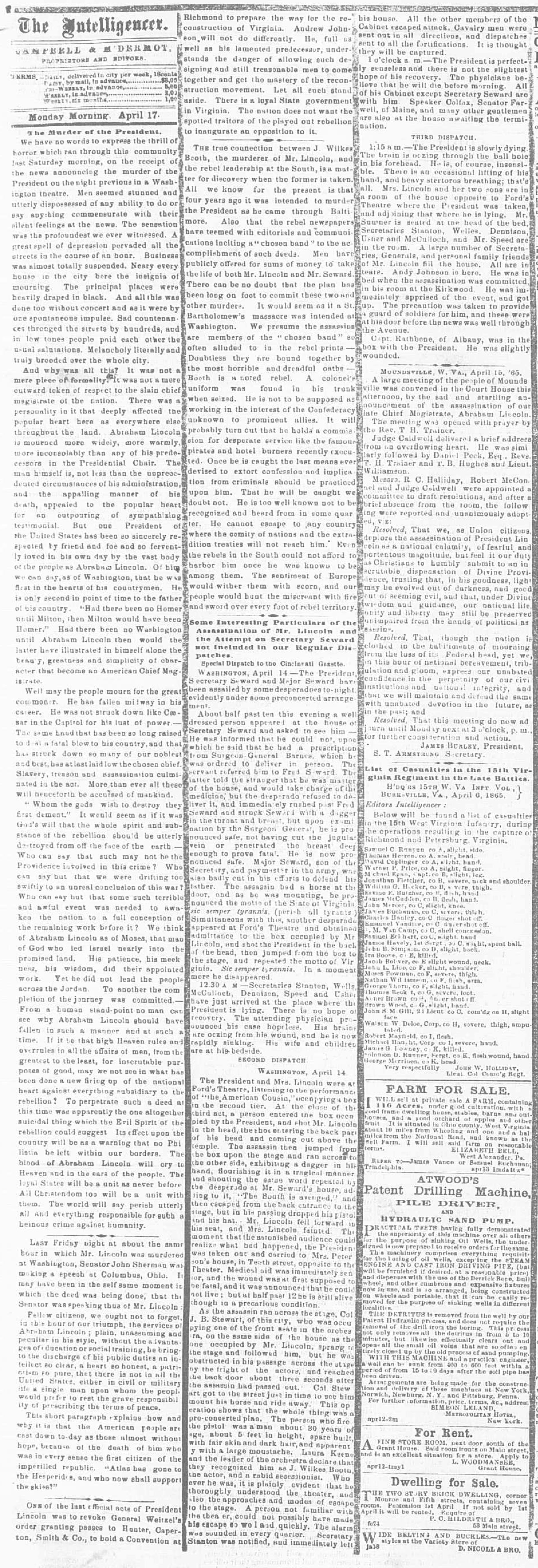
-
Description
April 17, 1865 edition of The Intelligencer which recounts the assassination and offers eloquent words of praise for Lincoln, stating, "Abraham Lincoln is mourned more widely, more warmly, more inconsolably than any of his predecessors in the Presidential Chair. The man himself, is not less than the unprecedented circumstances of his administration, and the appalling manner of his death, appealed to the popular heart for an outpouring of sympathizing testimonial" [...]
Attributes the murder to the "the same hand that has been so long raised to deal a fatal blow to his country, and that has struck down so many of our noblest and best, has at last laid low the chosen chief. Slavery, treason and assassination culminated in the act. More than ever all these will henceforth be accused of mankind."
The article also strongly condemns the conspirators, saying "they are bound together by the most horrible and dreadful oath" and that "once [Booth] is caught the last means every devised to extort confession and implication from criminals should be practiced upon him." -
Source
-
Rights
This item is in the public domain and may be reproduced and used for any purpose, including research, teaching, private study, publication, broadcast or commercial use, with proper citation and attribution
-
Creator
Daily Intelligencer
-
Date
April 17, 1865
